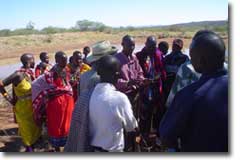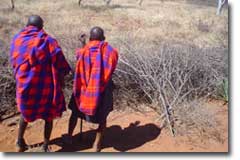|
|
Home > Activities
> Knowledge
Transference
|
 Training
and the transference of knowledge underpin all aspects
of the RAE programme. Training
and the transference of knowledge underpin all aspects
of the RAE programme.
Long term training,
extension and follow-up are essential to the success
of the RAE programme: both listening, with the
flexibility to change as lessons are learnt; and
continual training, to build local capacity for
maintaining increased wealth through new opportunities
created. A wide variety of extension and training
activities ensure that RAE’s knowledge is
successfully transferred, with information
disseminated locally, nationally and internationally.
Extension activities take various forms, but
traditional meetings or
barazas remain the most accepted local forum for
training and interactive discussion. Key to RAE's
constructive training and transference of knowledge
are tangible results and successful field owners who
actively promote the expansion of RAE initiatives by
practical example to numerous visitors and exchange
groups. |
| Exchange
Tours:
Participatory exchange tours have proven to be an
important means of training and transferring knowledge
to agro-pastoralist groups from Baringo and other
dryland areas. Men, women and youth groups visit successful
fields holding interactive discussions and exchanging
ideas with private field owners and shareholder groups
from different areas. Exchange tour participants are
often particularly struck by the untapped potential of
their arid lands, witnessing firsthand that proper
dryland management can yield productive and profitable
grasslands under a variety of different conditions.
Many participants request RAE's assistance in
establishing their own fields after a tour.
|
|

Exchange tour with Maasai
|
| Monitoring,
Evaluation and Community Mobilisation:
The overall direction, planning and implementation
of the RAE programme is based on a regular review of
extensive monitoring data from the community and
fields. The evaluation of data, defining community
response, uptake and need, is particularly important
in identifying implementation priorities and
strategies, which often change in relation to local
response and conditions. An important example of this
is the data collected and reviewed to plan the
reclamation programme, identifying the individuals and
communities ready to plant, replant and extend their
fields. Visits are made by RAE field staff to both
monitor and mobilise field owners: visits to monitor
and advise owners on sustainable management and
utilisation practices, visits to mobilise individuals
and groups to reclaim their degraded land. Equally
significant is the increased monitoring and
mobilisation carried out by successful field owners.
In a survey conducted in Salabani Sub-location, where
most land is now demarcated, people explained that
they had decided to plant their own grass fields
because of the advice and success of their neighbors.
Accurate record keeping underpins all research,
monitoring and mobilisation activities. RAE is placing
more and more emphasis on training local people to
monitor their own fields, using their records and
records from RAE as a management tool. Shareholder
groups, for example, are trained to keep accurate
accounts of meetings and decision making,
income-generating activities, members’
participation, and their field condition and
potential. |

Maasai admiring a field reclaimed
by RAE in Baringo
|
|
Transference
of Knowledge:
RAE’s knowledge and experience is transferred
locally, nationally and internationally through
practical example and the many training and extension
activities. Some of the main indications of knowledge
successfully transferred include: the increased number
and variety of income generating activities and real
profits realised from reclaimed private and communal
fields;
|
| the
greater number of successfully managed fields
reclaimed and reclamation requests received; the
growing number of women and women’s groups planting
and utilising reclaimed fields on a profitable basis;
and the greater contribution by RAE to dryland
development and policies through extension, training
and seminars, as well as increased dissemination and
collaboration with multiple partners. Overall the
uptake, adoption and replication of RAE initiatives in
Baringo and other dryland areas continues to increase,
with a noticeable change of more and more local
individuals and communities implementing innovative
initiatives on their own and/or taking greater
responsibility of activities started by RAE.
|
|